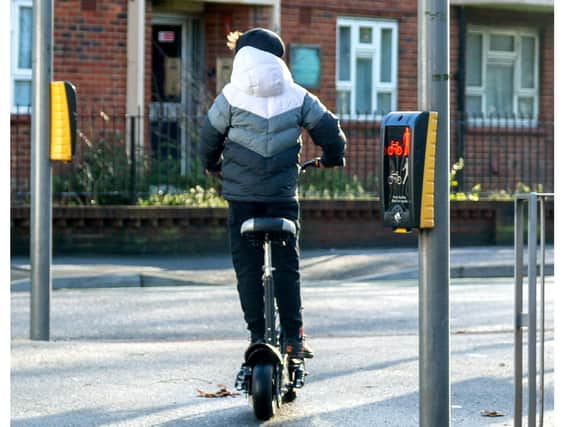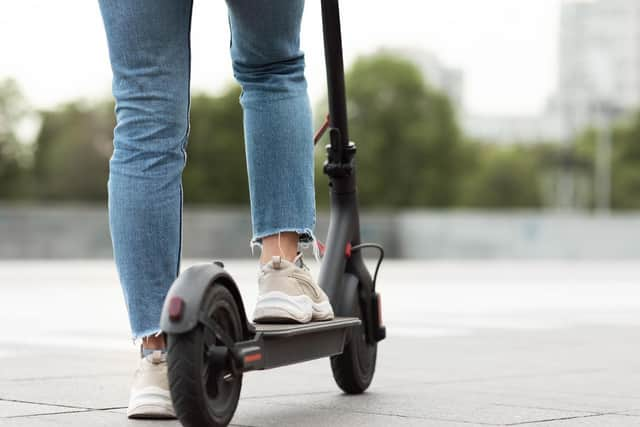Police remind e-scooter owners it is illegal to ride them on Banbury's roads, pavements or paths


The reminder comes after worrying descriptions on Banburyshire Info Facebook site of near misses involving young people riding e-scooters around town and residential areas, putting pedestrians and vehicles at risk.
The discussion online revealed widespread concern about the risks with e-scooters and it was clear the law over this form of transport is not fully understood.
Advertisement
Hide AdAdvertisement
Hide AdThis week Thames Valley Police who conducted special patrols in Banbury in early June in a bid to intercept people using e-scooters illegally, reminded the public that use of the machines is restricted to private land only. Riders must be over 18 and have a current driving licence.
A spokesman said: "E-scooters are classed as motorised vehicles so riding them unlawfully is a road traffic offence.
"Users risk being fined £300 and up to six points on their driving licence for driving without insurance. E-scooters may also be seized under section 165 of the Road Traffic Act for being used without insurance."
According to some research by dash-cam company Nextbase, electric scooters are predicted to be involved in up to 200,000 accidents this year and more than a million people in the UK are expected to own one by the end of the year.
Advertisement
Hide AdAdvertisement
Hide AdHowever, one in five e-scooters users is predicted to be involved in an accident and with no government requirement for riders to wear a helmet, there are concerns that the UK may follow the US in seeing 28 per cent of e-scooter accident victims sustain head or neck injuries. E-scooter riders are said to be 16 times more likely to be injured in any collision than a car passenger, according to the Nextbase study.


Their research was released last month, soon after an e-scooter-riding teenager died in south London following a collision and a toddler was left with 'life changing injuries' after an accident with an e-scooter in a public park.
Trials of rental e-scooters are currently taking place in 32 areas across England. The Government is not expected to make a decision on whether or not to permit the use of privately-owned e-scooters on public roads until after the trials complete next year. The Government proposes to allow e-scooters to use the same road space as cycles and electrically assisted pedal cycles (EAPCs). This means e-scooters would be allowed on the road (except motorways) and in cycle lanes and tracks, where possible.
The National Federation for the Blind has asked the Government to halt the trials because of the danger they pose to the blind and partially sighted.
Advertisement
Hide AdAdvertisement
Hide AdReaders on the Banburyshire Info site reported seeing e-scooters riding across red lights, travelling the wrong way down one-way streets and speeding through parks. One contributor described the driving of some users as 'reckless'. Others reported experiencing near misses as they walked innocently along pavements.
Although riding an e-scooter on public rights of way is illegal many are unaware of the rules which are available in full on the Thames Valley Police website here.
They say: "A privately owned e-scooter can only legally be used on private land and with the permission of the land owner.
"An e-scooter is classed as a powered transporter and is treated as a motor vehicle, so falls under the Road Traffic Act... subject to all the same legal requirements as motor vehicles; MOT, tax, licensing, insurance and specific construction regulations.
Advertisement
Hide AdAdvertisement
Hide Ad"As e-scooters can’t currently meet these requirements, riding a privately-owned e-scooter on a public road, pavement or other public area is a road traffic offence."
Bryn Brooker, head of marketing and road safety at Nextbase, said: “It will come as no surprise that we have seen an increase in the amount of serious e-scooter collisions from our dashcam users.
"We suggest that motorists take extra time to check their surroundings before they make any manoeuvres, always give e-scooter riders at least 1.5 metres of space when overtaking, and do not alarm them by beeping your horn or speeding up, this is likely to cause riders to lose concentration.
“We recommend that drivers use dashcams to capture any incident involving an e-scooter. This footage is accepted by all UK police forces and major insurance companies as proof of liability, helping protect motorists’ claims where there is a collision with an uninsured e-scooter.”